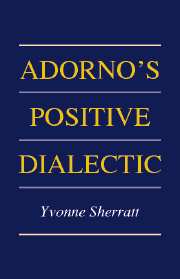Book contents
- Frontmatter
- Contents
- Preface
- Abbreviations
- Adorno's Positive Dialectic
- General Introduction
- PRELUDE TO ADORNO'S POSITIVE DIALECTIC
- Prelude I: Adorno's Intellectual Tradition: German Philosophy
- Prelude II: Adorno's Intellectual Tradition: Sigmund Freud
- ADORNO'S POSITIVE DIALECTIC: INTRODUCTION
- PART I NEGATIVE THESIS: THE DECLINE OF ENLIGHTENMENT
- PART II POSITIVE THESIS: THE REDEMPTION OF ENLIGHTENMENT
- 5 The Aesthetic: Aura
- 6 Knowledge Acquisition: An Aesthetic Form
- 7 A Positive Dialectic of Knowledge Acquisition
- 8 A Positive Dialectic of Subjectivity: The Instincts
- 9 A Positive Dialectic of Subjectivity: The Structure of The Self
- Concluding Comments
- Bibliography
- Index
7 - A Positive Dialectic of Knowledge Acquisition
Published online by Cambridge University Press: 10 August 2009
- Frontmatter
- Contents
- Preface
- Abbreviations
- Adorno's Positive Dialectic
- General Introduction
- PRELUDE TO ADORNO'S POSITIVE DIALECTIC
- Prelude I: Adorno's Intellectual Tradition: German Philosophy
- Prelude II: Adorno's Intellectual Tradition: Sigmund Freud
- ADORNO'S POSITIVE DIALECTIC: INTRODUCTION
- PART I NEGATIVE THESIS: THE DECLINE OF ENLIGHTENMENT
- PART II POSITIVE THESIS: THE REDEMPTION OF ENLIGHTENMENT
- 5 The Aesthetic: Aura
- 6 Knowledge Acquisition: An Aesthetic Form
- 7 A Positive Dialectic of Knowledge Acquisition
- 8 A Positive Dialectic of Subjectivity: The Instincts
- 9 A Positive Dialectic of Subjectivity: The Structure of The Self
- Concluding Comments
- Bibliography
- Index
Summary
INTRODUCTION
The question we address in this chapter is: what relevance does aesthetic knowledge acquisition have for the enlightenment? We will restrict our discussion in this chapter to knowledge acquisition itself. To see the relevance of this aesthetic ‘kind of knowing’ let us analyse the relationship between it and the enlightenment's ‘own’ instrumental kind of knowledge acquisition.
We must point out here that the existence of such a relationship (between these two forms of knowledge acquisition) is something that we can deduce from our interpretation of Adorno. It is not something that Adorno, in spite of many nuances, does himself explicitly depict.
First, we discuss the relationship between aesthetic and instrumental knowledge acquisition. We show that this is dialectical and depict the various forms that this dialectic might take. Second, we examine this ‘new’ dialectic (between aesthetic and instrumental knowledge acquisition) in relation to the ‘old’ (previously discussed) dialectic (between mythic and instrumental knowledge acquisition). We depict the ‘new’ dialectic as positive in contrast with the ‘old’ dialectic, which we have already shown as negative.
Third, we focus our discussion of knowledge acquisition upon the realm of identification. That is, we analyse the ‘positive dialectic’ between aesthetic and instrumental identification. To analyse this, we divide the overall discussion of the dialectic into two aspects: on the one hand, we examine the properties of ‘opposition’; and on the other hand, those of ‘connection’.
Fourth, we move on to answer our question.
- Type
- Chapter
- Information
- Adorno's Positive Dialectic , pp. 189 - 208Publisher: Cambridge University PressPrint publication year: 2002



